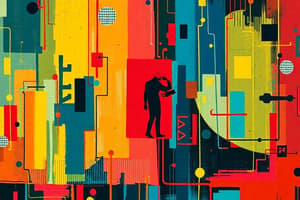Podcast
Questions and Answers
What is the definition of privacy in the context of information rights?
What is the definition of privacy in the context of information rights?
The claim of individuals to be left alone, free from surveillance or interference from other individuals, organizations, or state; claim to be able to control information about yourself.
What are cookies used for in online tracking?
What are cookies used for in online tracking?
To identify web visitors and store data about their visits to a website.
What is the purpose of web beacons or web bugs in online tracking?
What is the purpose of web beacons or web bugs in online tracking?
To monitor who is reading an e-mail message or visiting a website.
What is the concern with spyware in online tracking?
What is the concern with spyware in online tracking?
How do Google services use behavioral targeting?
How do Google services use behavioral targeting?
What is the impact of online tracking on individual privacy?
What is the impact of online tracking on individual privacy?
What technological advancements have contributed to the ease of personal data collection and analysis?
What technological advancements have contributed to the ease of personal data collection and analysis?
What is profiling, and what does it involve?
What is profiling, and what does it involve?
What is NORA, and how is it used?
What is NORA, and how is it used?
Why do mobile device manufacturers want to track their customers' locations?
Why do mobile device manufacturers want to track their customers' locations?
Should mobile phone customers be able to turn tracking off, and why or why not?
Should mobile phone customers be able to turn tracking off, and why or why not?
What are some potential ethical issues with mobile phone tracking?
What are some potential ethical issues with mobile phone tracking?
How can NORA technology be used, and what are some potential implications?
How can NORA technology be used, and what are some potential implications?
What are some potential consequences of the intersection of mobile device growth and data analysis techniques?
What are some potential consequences of the intersection of mobile device growth and data analysis techniques?
What is intellectual property, and how is it characterized?
What is intellectual property, and how is it characterized?
What are the three main ways that intellectual property is protected?
What are the three main ways that intellectual property is protected?
What is a trade secret, and how does it differ from a patent?
What is a trade secret, and how does it differ from a patent?
What is the primary purpose of the Digital Millennium Copyright Act (DMCA)?
What is the primary purpose of the Digital Millennium Copyright Act (DMCA)?
What are some challenges to intellectual property rights in the digital age?
What are some challenges to intellectual property rights in the digital age?
What is a key issue in computer-related liability problems?
What is a key issue in computer-related liability problems?
What is an acceptable level of system quality in terms of data quality and system errors?
What is an acceptable level of system quality in terms of data quality and system errors?
What is the significance of the 20-year period for patent protection?
What is the significance of the 20-year period for patent protection?
Flashcards are hidden until you start studying
Study Notes
Data Storage and Analysis
- Rapidly declining data storage costs enable organizations to maintain detailed databases on individuals.
- Advances in data analysis techniques and networking have made it easier to copy and access personal data from remote locations.
- Key technologies that raise ethical issues include:
- Profiling: combining data from multiple sources to create detailed dossiers on individuals.
- Nonobvious relationship awareness (NORA): combining data from multiple sources to find obscure hidden connections.
Mobile Device Growth and Tracking
- Mobile device growth has led to the tracking of individual cell phones.
- NORA technology can find obscure relationships between individuals, such as shared phone numbers with known criminals.
- Mobile phone manufacturers (Apple, Google, and BlackBerry) want to track customer locations for various reasons.
Privacy and Information Rights
- Privacy is the claim of individuals to be left alone, free from surveillance or interference, and to control information about themselves.
- The Internet brings challenges to privacy, including:
- Cookies: identifying browsers and tracking site visits.
- Super cookies (Flash cookies): tracking browser history.
- Web beacons (Web bugs): monitoring who is reading emails or visiting sites.
- Spyware: surreptitiously installed on user's computers to transmit keystrokes or display unwanted ads.
- Google services and behavioral targeting: using data to display personalized information.
Intellectual Property Rights
- Intellectual property refers to intangible property created by individuals or corporations.
- Three main ways to protect intellectual property are:
- Trade secrets: proprietary information not in the public domain.
- Copyrights: statutory grants protecting intellectual property from being copied for a certain period.
- Patents: grants of exclusive monopoly on ideas behind inventions for a certain period.
Challenges to Intellectual Property Rights
- Digital media differs from physical media, making it easier to replicate and transmit, but harder to establish uniqueness.
- The Digital Millennium Copyright Act (DMCA) makes it illegal to circumvent technology-based protections of copyrighted materials.
Accountability, Liability, and Control
- Computer-related liability problems arise from software failures, with questions about who is responsible.
- Liability for software failures is unclear, with different approaches comparing software to machines or books.
System Quality and Data Quality
- Flawless software is economically unfeasible, and an acceptable level of system quality is difficult to determine.
- Data quality and system errors are important considerations in system design.
Studying That Suits You
Use AI to generate personalized quizzes and flashcards to suit your learning preferences.




